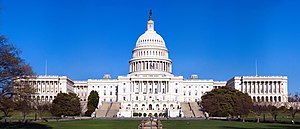
Image via Wikipedia
This afternoon President Obama signed into law the Tax Relief, Unemployment Insurance Reauthorization and Job Creation Act of 2010, an expansive tax relief bill that includes a number of pro-business provisions, including a two-year extension of the R&D tax credit and an allowance for 100% first-year expensing of qualified purchases for 2011 and 50% first-year expensing for 2012. Earlier this week, the Senate passed the bill by a vote of 81 to 19, and last evening the House passed the measure 277 to 148.
William R. Carteaux, president and CEO of SPI: The Plastics Industry Trade Association, issued the following statement concerning the signing of this important legislation into law.
“On behalf of SPI and the entire U.S. plastics industry, I want to congratulate President Obama and Senate and House leaders for effectively collaborating on the Tax Relief, Unemployment Insurance Reauthorization and Job Creation Act of 2010. This bipartisan legislation contains provisions SPI has long-advocated due to their critical importance to the growth and vitality of the nation’s plastics manufacturers.
“The new law not only provides consumer spending incentives by lowering taxes for most citizens next year, but also adds a needed jolt to the economic recovery by including measures that spur plastics innovation and strengthen the viability of many of our industry’s small and mid-size companies.
“In addition to a two year extension of all tax rate reductions enacted early in the last decade, the new law permits full, 100% first-year expensing of qualified purchases for 2011– and even those retroactive to September 2010 – as well as 50% first-year expensing for 2012. This dramatically shortens the time period in which companies can recover the cost of capital equipment and machinery purchases, allowing them to write off their investments fully before the end of next year or by half on purchases made in 2012.
“The new law also extends the R&D tax credit, which expired at the end of 2009, retroactively to the beginning of 2010 and forward to the end of 2011. Innovation has always been the prime characteristic of our industry. From new polymers to new processes, bright ideas have propelled plastics through the decades to meet societal needs as they arise. The federal R&D tax credit continues to be essential to U.S. plastics manufacturers because it helps boost industry investment in research done in the United States and is essential for sparking innovation of new products and competitiveness in world markets.
“Finally, the income tax aspect of the law directly impacts the plastics industry segment paying taxes at individual rates based upon incorporation status (Subchapter “S” corporations, for example), but the indirect effects impact the entire value chain. Without passage of this legislation, tax rates on many of our industry’s small and mid-size companies would have risen nearly 5% in 2011.
“I would personally like to thank all of our members who responded to our grassroots advocacy efforts and urged their lawmakers to pass this historic tax bill. Looking toward the future, SPI’s advocacy team is eager to work with Congress and the Administration on making these temporary tax measures permanent.”
About SPI
Founded in 1937, SPI is the plastics industry trade association representing the third largest manufacturing industry in the United States. SPI's member companies represent the entire plastics industry supply chain, including processors, machinery and equipment manufacturers and raw materials suppliers. The U.S. plastics industry employs 1.1 million workers and provides nearly $374 billion in annual shipments.


There are no comments
Please login to post comments